Do Animals Suffer?
The idea for this blog came to me after I made a collage in which a scorpion juggles. I wondered, when I finished the collage, how intelligent are scorpions?
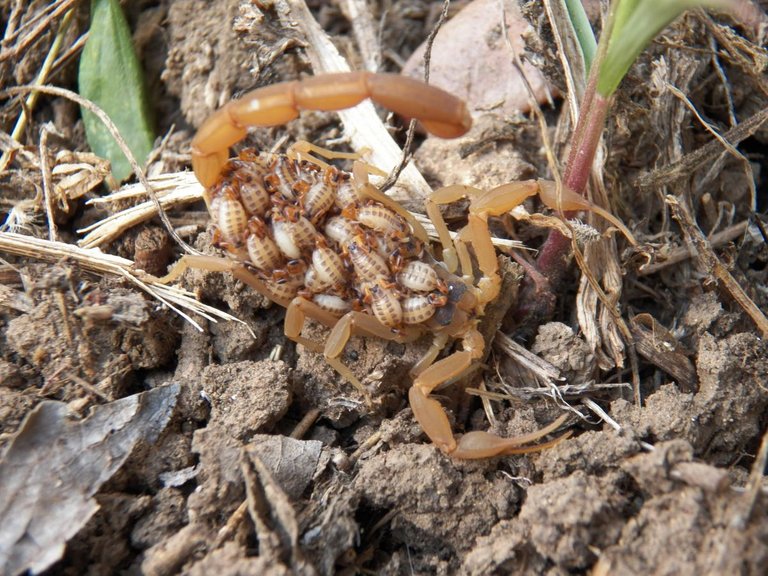
Image credit: JawnTEM. Used under a CC 3.0 license. Scorpions give birth to as many as 100 young at one time. The young are carried on the mother's back for 10 or 20 days because they have not yet developed an exoskeleton. Once they do, they crawl off and begin life on their own. Mother will not eat them (!) unless she has no other food. However, a scorpion can go up to 12 months without eating, so the babies might be OK.
After doing some reading, I found nothing that told me specifically about scorpion intelligence. The only relevant bit of trivia I came up with was a reference to scorpion suicide. If scorpions could be so frightened, so upset, that they sting themselves to death, that would indicate the ability to form a plan and carry it out. It would also indicate that scorpions have emotions. This would be an indication not only of intelligence, but of sentience. The question of sentience in (nonhuman) animals has received a lot of attention of late. It is an issue to which I have personally given much thought.
However, reports of scorpion suicide were not helpful in determining sentience of the animal. These reports turned out to be urban myth. Scorpions are immune to their own venom.
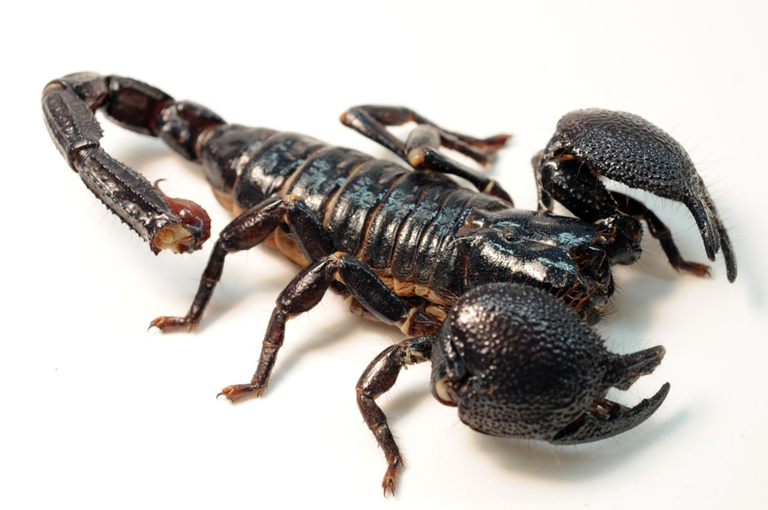
Image credIt: Rosa Pineda. Used under CC 3.0 license. This is one of the largest scorpions in the world. It is found in Africa. Despite its size, the scorpion is not considered dangerous to humans.
Are scorpions intelligent? Are they sentient beings (Do they have consciousness, an awareness of their existence)? Is there a way to ascertain intelligence, or sentience, in nonhuman animals? These questions are not esoteric, or an academic exercise. They have implications in the real world, for animals and for human behavior toward animals.
The catch with this issue is this: not only is no one studying sentience in the vast majority of animal species in the world, most of the species (estimated at 8.7 million), have not been identified. The lack of information about sentience and intelligence is especially true when it comes to invertebrates. Without those studies, animals will receive no legal protection, no acknowledgment of a right to humane treatment.

Is there a way to assess the scorpion's sentience and win for it at least acknowledgment that it is entitled to humane treatment, that it exists in our moral circle?
According to the peer-reviewed journal Animals, ”...animal sentience refers to the ability of animals to experience pleasurable states such as joy, and aversive states such as pain and fear." The problem with assessing sentience in animals is, how do we do it? Even determining pain and awareness in humans is challenging. Neuroscience is trying to develop metrics for pain evaluation in noncommunicative (human) patients. There is no certainty that current methods are reliable.

As is true for assessing human distress/pain, determining the existence of this experience in animals is largely an unmet challenge. One method for acquiring this information is to observe changes in the parts of the brain associated with distress/pain. Unfortunately, with animals, especially with invertebrates, the “brain” may be very different from what we are familiar with in humans.
Scorpion Brain
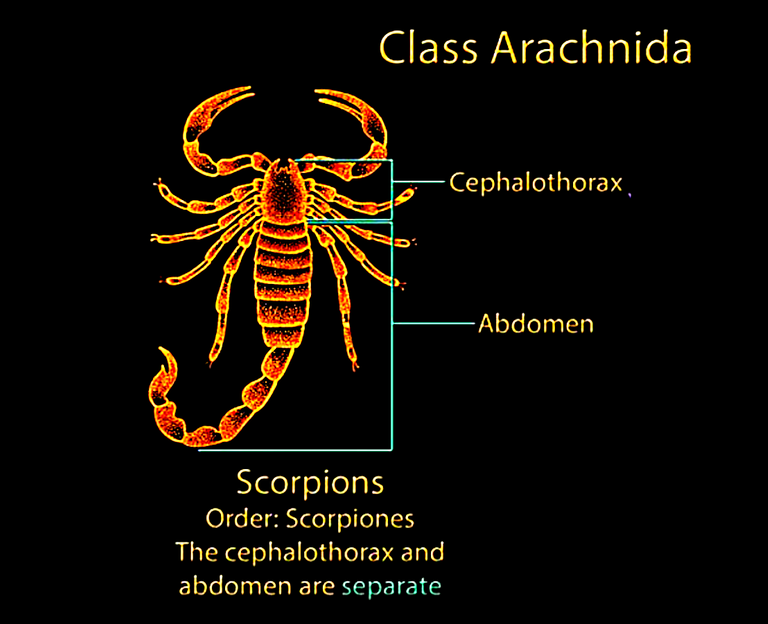
Image credit: U. S. Public Health Library. Public domain
In a scorpion, there no 'head' as we are accustomed to thinking of this appendage. The scorpion head, as it were, is contained in the cephalothorax. The brain consists of "two large ganglia that surround the esophagus. One section of the brain interprets optical sensory and is the source of complex behaviors. The other part of the brain controls movement."(Information derived from Studies of the Nervous System, on Weebly)
In humans, response to pain is often assessed by observing changes in the cerebral cortex. However, there is no cerebral cortex in an invertebrate brain. The absence of a human-like brain structure has led in the past to the belief that invertebrates do not have the neural structure that allows for the experience of emotions. Having come to that conclusion, researchers decided that inveterbrate animals could not suffer. In the handling of invertebrates, whether in general commerce or in research, there was no need for humane considerations, because these simple creatures could not suffer.

Perhaps we should not be surprised to learn that the anthropomorphic position (if it doesn't look like a human it can't feel like a human) about invertebrate suffering has been debunked. Certain invertebrate, researchers have determined, do suffer. They are sentient. Given the paucity of studies, however, this designation covers only a few species.
Last week there was a seismic shift in the area of animal sentience. The UK government moved to issue protections (without force of law) to cephalopod molluscs and decapod crustaceans. These animals will now be included in the U.K.'s Animal Welfare (Sentience) Bill. The move follows a declaration by the London School of Economics and Political Science (LSE) that these creatures are sentient beings.

How do scorpions fit in the picture? Scorpions, it turns out, are neither decapods nor cephalopds. Scorpions are arachnids, related to spiders. If we don't know much about scorpion intelligence, how about spiders?
Fortunately (for my investigation), there is research on spiders which sheds light on their intelligence. It was recently reported that though spiders have minuscule brains, they are intelligent. Most intelligent are those that hunt, rather than those that wait passively for prey.
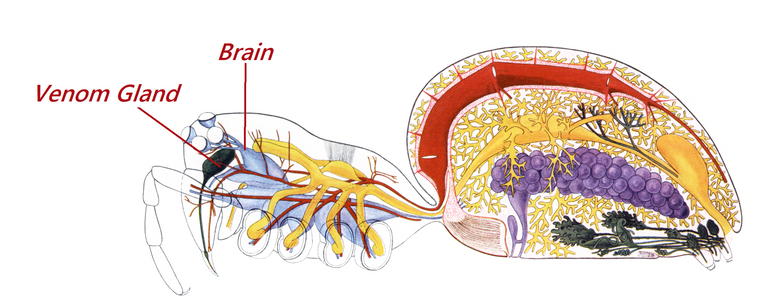
Image credit: John Henry Comstock public domain. Location of brain and venom sack derived from biologywise.com
The argument for spider intelligence is pretty well established, and the case for sentience is growing. An article in AnimalsAsia suggests that spider self-awareness is demonstrated in Peruvian spiders that create decoys. The authors write:
For a spider to make a decoy statue of itself..., it must understand itself as an individual separate from the environment... It must know what it looks like, and that it sits in a web, and must know how to create the structure which represents itself – anecdotally demonstrating their capacity for self-awareness."
No doubt, there are researchers who would not make the leap of ascribing sentience to spiders. However, there is certainly an argument for the position. Can we extrapolate this position to scorpions? Let's look at their behavior.

Image credit: prof.bizzzarro. Used under CC 2.0 license. There are an estimated 2,200 scorpion species in the world. While variety in mating practices may be found, all scorpions seem to engage in a pre-mating ritual called a promenade à deux.. Very rarely, the female may eat the male after the fact. In some cases there is evidence of social behavior (sharing of food or burrows). (Information derived from an article by Joseph Castro on Live Science)
Scorpions hunt their prey. Hunting strategy varies by species and circumstance. According to an article in ScorpionWorlds, a scorpion may ambush its prey. It may use a variety of techniques to kill, depending on the characteristics of the prey. Quoting from the article, "Although they have the same resources, not all hunt in the same way.”
For larger scorpions, tearing the prey apart with pincers is effective. For smaller scorpions, such as juveniles, envenomation is required to immobilize the victim. After the prey animal is subdued with venom, the scorpion sets about the final coup de grace. In the case of emperor scorpions, the young are large enough to use both techniques. They may sting prey and then attack, or they may simply attack and overwhelm prey with their larger size. They would rather conserve venom than use it, because creating venom is metabolically costly.
Scorpions use strategy. They vary technique depending on circumstance.
Scorpion Tactical Defense: Squirting Venom
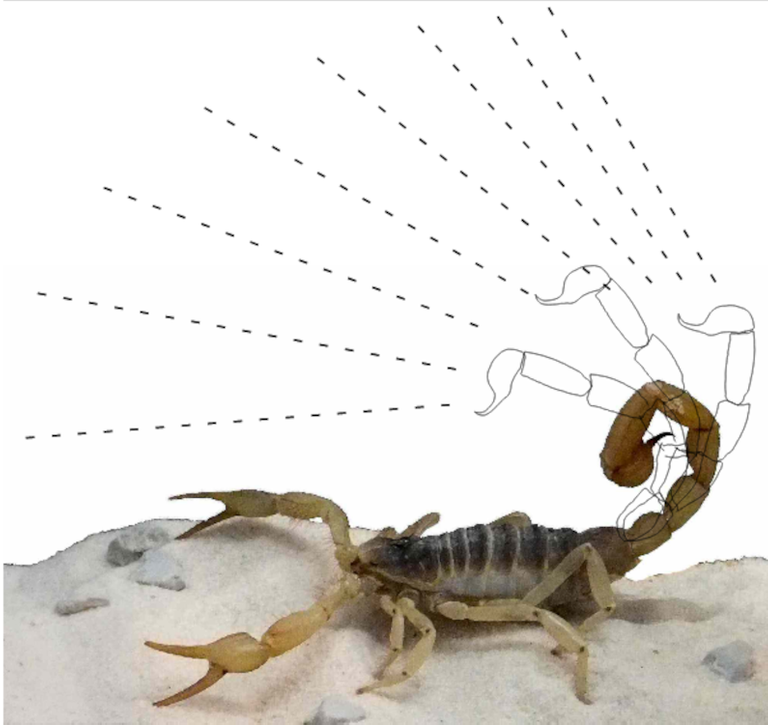
Image credit: Ian Alexander. Used under CC 4.0 license. One of the defensive tactics a scorpion might use is to squirt venom from its stinger. According to an article in the journal "Behavioral Processes", "venom spraying might be useful as an antipredator function and can be modulated based on threat."
When it comes to defense, scorpions are, once again, strategic. According to Science Daily, scorpions choose one method of defense over another. Quoting from the article, which described observed behavior, “Scorpions usually selected their strongest defensive behavior; for instance, species with strong pincers more often used their pincers in defense”.
What I found very interesting is that the speed at which a scorpion delivers venom varies according to whether it is in a defensive situation or an offensive (hunting) situation. In offensive situations, the stinger is deployed deliberately, even slowly, and strategically. In defensive circumstances (survival on the line) "the stinger is rapidly launched towards the perceived threat, often without gripping the source of the threat with the chelae (pincers)."
Scorpion Intelligence and Sentience
Jumping Spider (Trite.planiceps)**
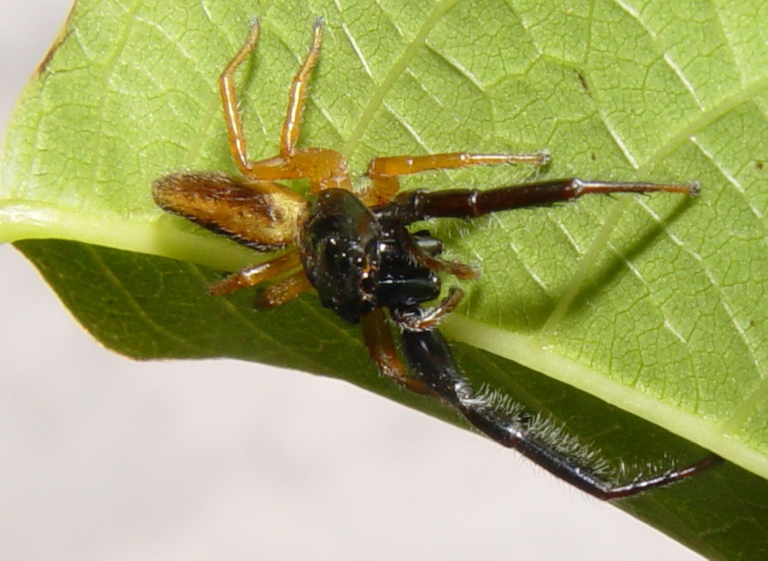
Image credit: Thomas Howard. Used under CC 1.2 license.
If we compare what we know about spider intelligence, and scorpion intelligence, it is obvious that both animals are engaged in similar hunt engagements and both are strategic predators. A clear case for intelligence in scorpions may be made indirectly. As for sentience:
It is beyond my ability to find anything that asserts scorpion sentience. If we infer (as I am inclined to do) that scorpion cognition implies sentience, then we may conclude that they are sentient beings. But there is no way I can prove this. Let me know, please, if you come up with specific information on the subject.

Conclusion
I've gone on a bit about scorpion sentience and some readers may ask, to what end? Are we not supposed to kill scorpions? Are we not supposed to kill arthropods, and all the millions of animals which may pose a risk to us or may provide nutrition? That is not the purpose of my blog. My blog simply posits the proposition that when we engage with animals, any animals, we should appreciate the possibility (indeed the likelihood) that they may suffer. As some sources are inclined to suggest, we ought to include them in our moral circle.




Credits/Sources
Images (not already credited in the blog):
Scorpion Accent
 Clikr-free vector image, Pixabay
Clikr-free vector image, Pixabay
Octopus Accent
 ArtsyBee on Pixabay
ArtsyBee on Pixabay
Selected Research Sources
1.https://study.com/academy/lesson/scorpions-life-cycle-reproduction.html)
2.https://www.pressreader.com/australia/science-illustrated/20140601/281874411485871
3.https://animals.sandiegozoo.org/animals/scorpion
4.https://cites.org/eng/gallery/species/invertibrate/emperor_scorpion.html
5.https://www.animal-ethics.org/sentience-section/introduction-to-sentience/problem-consciousness/
6.https://www.americanbar.org/groups/tort_trial_insurance_practice/publications/committee-newsletters/enshrining_animal_sentience_into_law/
7.https://www.bbc.com/news/science-environment-14616161
8.https://www.animal-ethics.org/sentience-section/animal-sentience/invertebrate-sentience-a-review-of-the-neuroscientific-literature/
9.https://www.ncbi.nlm.nih.gov/pmc/articles/PMC4494284/
10.https://www.tandfonline.com/doi/10.1080/09602011.2019.1614464
11.https://english.stackexchange.com/questions/207718/looking-for-a-common-word-meaning-hands-and-feet-as-well
12.https://nervousbiology.weebly.com/scorpion.html
13.https://www.nature.com/articles/s41598-020-62525-7
14.https://cob.silverchair-cdn.com/cob/content_public/journal/jeb/220/21/10.1242_jeb.151308/6/jeb151308.pdf?Expires=1641325231&Signature=dspysTgWXz2-UsB2-5MH4ep9N-4iqAf4XUtYtJwx3GqeiHX9EsKEzG7FLAbjCSXHHdP3MIr~c4vsQF6cBZZ9890OSEfd2P6coB2DiMm5lNHda~5DUh9bkfSmRG5g8r-hHPeKXjNTCXn2aQ3vm0~PDzRbE9CL3oWApQS0VQWlAcuQxBdtgvO-bYpNlKs4gIcgHONPVe7Ayqpf-Hl21KGTJHAbQajVab84a8Noyqoy0PW9h36dSFV9XvsH7I~AC34DA3DtZ2FXMZ4SWBFG8RdzY6ntLBjpBDHDP2ZxrLyLJpeUhbKhtO0P1QUSILy19minWaft0j19s2jWygH6~2Witg__&Key-Pair-Id=APKAIE5G5CRDK6RD3PGA
15.https://www.gov.uk/government/news/animals-to-be-formally-recognised-as-sentient-beings-in-domestic-law
16.https://knowablemagazine.org/article/mind/2021/are-spiders-intelligent
17.https://biologywise.com/anatomy-of-spiders
18.https://www.animalsasia.org/us/media/news/news-archive/self-aware-spiders-fascinating-arachnid-builds-its-own-lifelike-decoys.html
19.https://www.livescience.com/54981-animal-sex-scorpions.html
20.https://www.scorpionworlds.com/scorpion-feeding/
21.https://www.frontiersin.org/articles/10.3389/fevo.2019.00196/full
22.https://daily.jstor.org/how-does-a-scorpion-decide-when-to-sting/
23.https://www.sciencedirect.com/science/article/abs/pii/S0376635715000753
24.https://www.eurekalert.org/news-releases/625328
25.https://besjournals.onlinelibrary.wiley.com/doi/full/10.1111/1365-2435.12855
26.https://www.lse.ac.uk/News/News-Assets/PDFs/2021/Sentience-in-Cephalopod-Molluscs-and-Decapod-Crustaceans-Final-Report-November-2021.pdf
27.https://www.gov.uk/government/news/lobsters-octopus-and-crabs-recognised-as-sentient-beings?utm_medium=email&utm_campaign=govuk-notifications&utm_source=994c7ffd-9c00-4347-9563-bc9a0754ecad&utm_content=immediately
28.http://www.findaspider.org.au/info/spiderns.htm
29.https://askabiologist.asu.edu/scorpion-facts
30.https://leidenlawblog.nl/articles/why-should-non-human-animals-be-included-in-our-moral-circle
Here is your Proof of Brian. I think you meant #ProofOfBrain

Source
Oh no, I didn't. Sorry!!!
Your sentience article made me wonder if there is an animal (other than humans) which can atain a pleasurable state (like joy) through inflicting pain on others.
That's a question. And we have to imagine the answer in the affirmative. Why not? If we are going to credit them with other emotions, why not hate, revenge, spite?
What a kettle of worms (what's on their minds?). Thanks @mathowl for scrambling my thoughts even more :))
Great to see you here.
Haha, this is next-level question :)
:))
Thanks for your contribution to the STEMsocial community. Feel free to join us on discord to get to know the rest of us!
Please consider delegating to the @stemsocial account (80% of the curation rewards are returned).
Thanks for including @stemsocial as a beneficiary, which gives you stronger support.
Thank you @stemsocial. It feels great to be supported by the stem community.
From today I see these animals with different eyes and just not immediately panic.
Thanks to you! 😎
I have never seen one up close (New York isn't famous for its scorpions), but I think I would panic :)
Thank you for reading and responding. I appreciate that very much.
That's what I did the first time I saw one. 😂 😎
What an interesting article. I learned a lot about things I was not expecting to even get interested in: scorpions. (This is why reading posts of others is interesting: we get information about subject we would not have searched for otherwise.)
I actually didn’t know a thing about them. As a side note, I mostly convinced myself that scorpions were sentient animals after reading the caption of the first picture of this post. The way they behave with their kids seems to be sometimes even better… than what humans do (not always, but sometimes). Of course this is by far not rational, and you demonstrated that we should not be that conclusive so quickly.
I would like to think as follows. The fact that they hunt demonstrates that they are intelligent beings (as you wrote). Then, what's next? I am tempted to conclude (without proofs) that they should also have emotions, as to hunt we need to be able to think about victims. But that's probably a completely wrong statement from the scorpionic standpoint (but it is interesting to consider it anyways).
In any case, thanks for the interesting reading. As I wrote, I learned a lot!
So happy to see you here @lemouth. I agree about the first picture. Throughout the blog I had to refrain from making subjective statements, because I wanted to be persuasive and I wanted science to be my instrument. But oh yes, of course animals are sentient. I remember Darwin wrote about the suffering inflicted by parasitic wasps on their victims. I mean, Darwin!! It is inconvenient to think these creatures have feelings. Then we have to be thoughtful in our treatment of them.
I'm glad you learned a lot. I learned a lot in writing. So many questions opened up. So many questions without answers.
Think of how hard it is for us to understand what goes on in the mind of an autistic person. Or a comatose person. Understanding eludes us, which means, I believe, we should err on the side of compassion.
Thanks for that great comment and for reading my long blog.
As an author, it is clear you need to restrain the speech. As a commenter, I have more freedom with this respect.
To come back to Darwin and the discussion, we must keep in mind that knowledge of that time is not today's knowledge. Something that may sound cruel and immoral today could have been "normal" hundreds of years ago (regardless whether we agree or disagree). This being said, even if there is no scientific proof (yet?) that animals are sentient, they may be (I guess this is clear and does not need to be proven). Therefore, we should behave as they are (better be sure than sorry).
PS: I am not afraid of long blogs as you can imagine ;)
😇🐙
This post had me feeling prickly all over. I checked under my chair just to make sure 🦂
Do scorpions have sentience? If they do, it's probably a rudimentary and "primitive" sentience. Just check that picture of the mother with her baby scorpions, if that isn't "love", then I don't know what is. That is very uncomfortable (and possibly dangerous) for her, so there must be a mechanism that prevents her from shaking them off. We can call this mechanism "love," a type of pleasure that is a quality of sentience. But it's a primitive love based on the immediate needs of survival. Mama is gonna hold on to them until they're old enough to go and fend off on their own. With a human, it's more complicated. Therefore, love as a variable, is more complex. I suspect that if we dig scientifically, then we're going to find the same with other aspects of sentience. Right now, the roadblock that I see is that there is no adequate operational definition of sentience.
This is a rather broad definition, and as you indicate, it's difficult to measure even in humans. But even if we were able to precisely measure it, surely we could find that any organism is capable of feeling pleasure, pain, and fear on some level. If not at the individual, then at the group level. We're then left with a moral conondrum, if all organisms have sentience, then should we stop killing them all? Impossible, given that, as you indicate, our survival depends on the destruction of other organisms. So, then on what basis do we decide whether to kill one organism or another? Right now, it seems we base our decision on size, intelligence, and aesthetics. Environmental agencies do work with plants and animals that are not in many people's radars such as frogs and moss. So, there is work being done to protect them not just on the basis of the qualities I mentioned but rather on the role they play in the ecosystem.
I read about some Buddhists monk who made a vow not to kill any sentient being, and since they believe all animals are sentient (possibly reincarnated humans), then they only walk a few steps every day to avoid killing animals, even insects. That's one way of doing it, though clearly not a feasible lifestyle for most of us. So many conondrums!
Wonderful article and fascinating (in a prickly kind of way) topic.
What a thoughtful comment--but then, you are @litguru :)
I think we can start by being thoughtful when we kill. By that I mean, it should cost us when we take a life. I believe (my philosophical,ethical perspective--not scientific) that all life is related. When we start creating hierarchies based on ability or utility, then what are we really saying? Does a disabled person without measurable cognitive skills have less value than someone with superior intellectual ability? Is the serf worth less than the lord? Do we value the suffering of one over the other?
Jainism came to mind when I wrote this. It's all very difficult and I have no answers except for this: If we insist that is is necessary to kill, then we need to be aware that we are taking life, that we are making a choice. Even when we use resources, cut plants in order to provide for ourselves, be aware, be judicious and respectful.
Animal experimentation certainly comes to mind. How many guinea pigs and frogs have been sacrificed in high school science classrooms when that information can as easily be obtained from a textbook? I tested this once: told the college bio lab teacher I didn't want to dissect an animal. She told me OK, as long as I could pass the test, which was to identify organs in a dissected pig. I studied diagrams and passed with flying colors. Think of all the pigs that were wasted that year, in that one class. Think of all the wasted life, all the suffering inflicted on animals in all the laboratories, for no real purpose.
Well I did go on, didn't I? Sorry....
Thanks for stopping by, @litguru and commenting.
It is definately a complex problem. Maybe 3D printed meat will save the day.
As an anecdote, I was on a trip to Spain once, when I saw a documentary on octopus intelligence. That same day, I went out to a place where everyone was drinking wine and eating octopus. That's the tradition there. Imagine me surrounded by all those happy people drinking and eating octopus. Had I not watched that documentary, I would have partaken of the octopus party. As it happened, I did not. I still regret it in my weak moments, but to this day I have not touched another octopus. :)
Honestly speaking, I found this post highly educative. You have also set me thinking. @mathowl somewhat capture my thought in his thoughtful comment. Thank you for the interesting post
Thank you very much for that kind appraisal of my blog. I was educated, also, when I wrote it. I did begin the blog with a belief, but I wanted to learn more and I also hoped to persuade people to at least think about the issue.
There are no set answers, but we do have indications that animals feel. Until we know otherwise, morally we have to avoid inflicting suffering, even if we only suspect it exists. (My opinion, which I refrain from expressing in the blog).
Thanks again for reading and commenting.
Congratulations @agmoore! You have completed the following achievement on the Hive blockchain and have been rewarded with new badge(s):
Your next target is to reach 9250 replies.
You can view your badges on your board and compare yourself to others in the Ranking
If you no longer want to receive notifications, reply to this comment with the word
STOPCheck out the last post from @hivebuzz:
Thank you for the notice, @hivebuzz
You're welcome @agmoore, that's with pleasure 😊👍
Siempre se aprende, mis respetos por su trabajo.
Thank you very much for visiting my blog. I love to write science articles, but they are very hard. My training is in the liberal arts so every time I write a science blog it's like going back to school.
Great fun, though :)
That is such a cute picture of the babies on the mother scorpion’s back. I try not to kill a spider and will pick them up in a Kleenex and put them outdoors.
I hate to see people stamp on an insect that minding it’s own business outdoors, or kill an animal for no reason. Children should be taught at an early age to respect them and realize we must share the earth.
I do like the Buddhas philosophy. Now flies & mosquitoes, that get in the house, is a different thing and hopefully they have no feelings when I whack them. :)
:))
When it comes down to me or them, I win ;) I say, if you have to do it, make it quick. And yes, spiders get a free ride.
Thank you very much for reading my blog, dear @redheadpei. So many questions that have no answers, at least not yet. All we can do is try not to be arrogant or cruel. Just because we can do something (kill!) doesn't mean we should.
I'm working on my collage. Wow is this one taking a long time. Oddly enough, I'm enjoying that. I have to pull myself away to take care of responsibilities. Hope you have the most wonderful Sunday.
Here's your 500° vote!..
Well I think that any animal suffers, the difference is that we as humans are able to intellectualize that suffering and be aware of death. Animals are subjected to natural law, they are less conciuss about the cause-effect laws in time (thay act mostly by instincts) so from certain perspective they are more "machines" than us, but they may suffer too.
I thank you very much for appreciating my blog. It took a long time because I didn't know a lot of this when I started writing.
Are we the only animals that have an awareness of death? How do we know that? Cats go off to die when their time comes. I've seen it. And elephants--they grieve their dead. That is documented. What is in their heads? I cannot say. Do they have existential angst? Really, it doesn't seem likely, but do we know? What is the line between instinct and deliberate action, even in humans? Do we really know?
None of these questions I have answers to. However, it heartens me to know that others (such as you) are out there asking the same questions.
Have a wonderful Sunday.
Cats tend to hide when they are very sick or injured, as an instinctive reaction to avoid being exposed to potential predators. Do they know they are going to die? Perhaps they do, but perhaps they are not as aware of it as we are.
Many animals experience pain at the death of another, but perhaps they do not intellectualize it to the same level as we do, perhaps in a more primitive way. It is not in an animal's best interest to be depressed about the death of another, it should focus on survival. An animal does not want to be depressed by the death of another animal, it should focus on survival. Humans, on the other hand, no longer focused on survival, developed more intellect.
These are interesting issues that still do not have definitive answers. Best regards!
My brother,the first picture you put here is something I would title "Scarry". I fear that arachnid very well.
Nice post dear @agmoore
Thank you so much for reading my post! Mama scorpion will surely fight to protect those babies. I would stay away:)
Fascinating, isn't it, that we fear this creature and yet it is a good mother. Alligators are also doting mothers. Nature surprises us all the time.
I hope your Sunday has be pleasant, @ezeemmanuel. Thank you again for reading my science blog.
What a nice content man @agmoore
I would read it ten times again. Mother scorpio is so caring from your point of view and that makes it an enemy of man. Hence, we say that any movement of man towards her direction becomes strictly a danger.